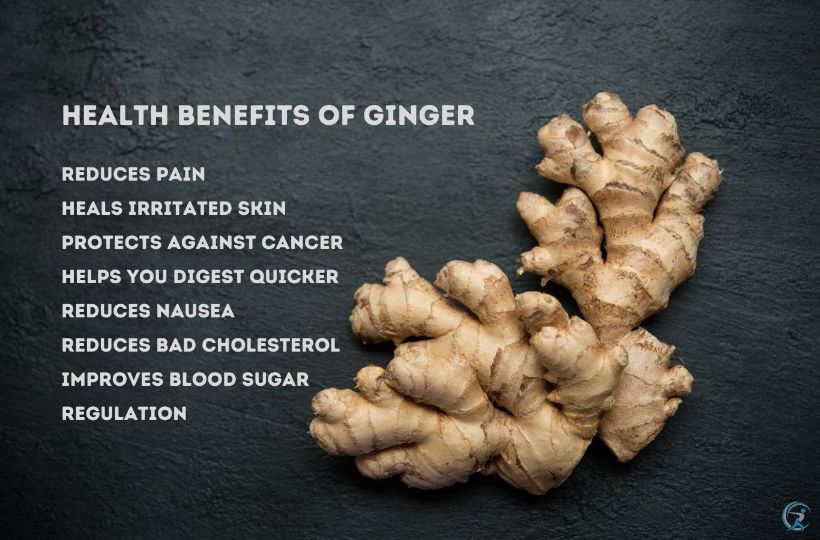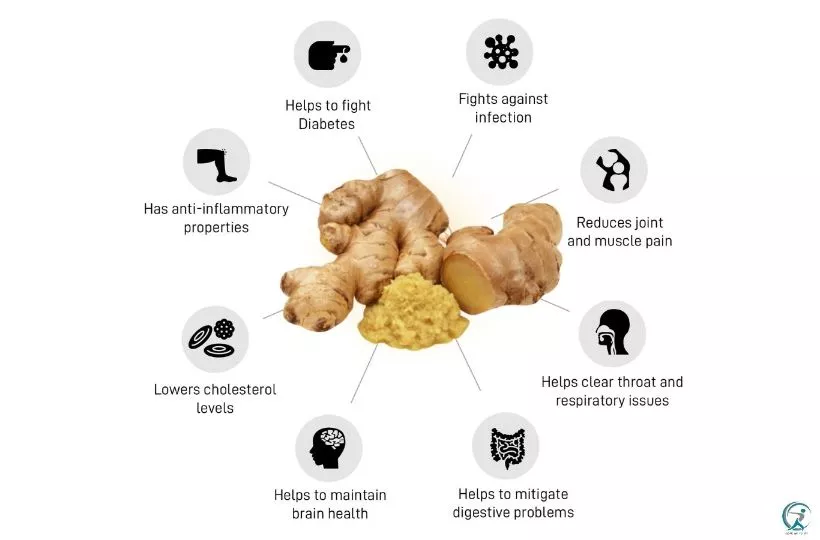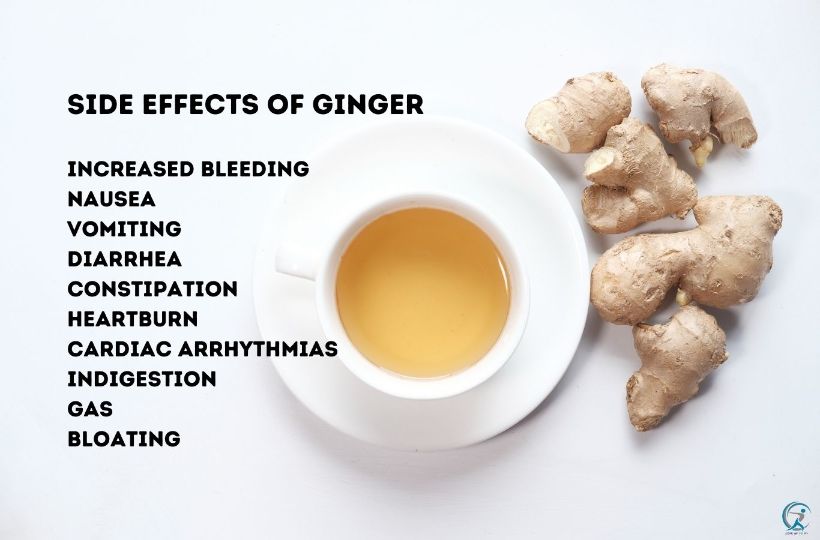Ginger has been used as a spice since ancient times. It is now being used as an effective remedy for many ailments. In this article, you will find out the Health Benefits of Ginger.
⚡ Key Takeaways
- Ultimate Nausea Buster: Crushes motion sickness and morning sickness faster than meds, per 2026 trials.
- Anti-Inflammatory Elite: Gingerol rivals NSAIDs for joint pain and muscle recovery.
- Digestion Dynamo: Ends bloating, gas, and IBS flare-ups with gut-soothing prowess.
- Immunity Igniter: Battles colds, flu, and bacteria like E. coli via boosted white cells.
- Heart Hero: Drops cholesterol 15%+ and cuts oxidative stress for 2026 longevity.
Ginger, a zesty root powerhouse, slashes nausea by 40%, fights inflammation via gingerol, aids digestion, eases muscle pain, and bolsters immunity—2026 studies confirm these perks with enhanced bioavailability from new extracts.
Versatile in teas, shots, or meals, ginger elevates everyday health effortlessly.
The Health Benefits of Ginger
The Chinese and Indians (and most other cultures worldwide) knew about its amazing health benefits before discovering it.
Ginger has many health benefits, such as relieving nausea, motion sickness, morning sickness, and migraines.
It is excellent for digestion and has impressive anti-inflammatory properties.
Ginger is one of the most popular herbs in the world. It’s been used to treat a variety of ailments for thousands of years, and its popularity hasn’t waned. It’s versatile, easy to use and often very effective at helping to treat nausea, food poisoning, bloating, gas and other gastrointestinal issues. Ginger has even been shown to help keep ulcers from forming by stopping stomach acids from hurting the stomach. Here are some ways that ginger can help keep your body healthy:
The Health Benefits of Ginger

Ginger can be used as a home remedy for nausea.
If you have been experiencing nausea, ginger can be a great remedy. Ginger is known to help reduce the physical symptoms associated with nausea. Ginger tea is effective at relieving nausea and vomiting, especially when you are suffering from morning sickness during pregnancy or motion sickness.
To make ginger tea, simply add 2 teaspoons of grated ginger root to 1 cup of boiling water and let steep for 10 minutes before drinking. A stronger brew may be achieved by adding more grated ginger root or steeping longer.
Ginger is often included in remedies to fight colds and flu.
Ginger is often included in remedies to fight colds and flu. In fact, it can be found in everything from teas to tinctures—and it seems to be pretty effective.
Ginger has been shown to help reduce inflammation, which is key when fighting off a cold or flu virus. It may also have antiviral properties that help ward off illness by boosting your immune system.
And while you might think this would only work for people with the sniffles, ginger might actually help those who don’t have an infection but are experiencing symptoms like nausea or vomiting due to their illness.
The active ingredients in ginger contribute to its anti-inflammatory properties.
Ginger is a potent anti-inflammatory that can help you feel better when you have an upset stomach.
The active ingredients in ginger—gingerol and shogaol—are strong anti-inflammatory compounds, and they also have other benefits such as preventing cancer and fighting viruses.
Ginger may also help reduce bloating, gas, and other digestive issues.
Ginger also has anti-inflammatory properties and can help relieve symptoms of indigestion and gas. A study published in the Journal of Ethnopharmacology found that ginger has a “potent antiulcer activity” when taken with milk, while another study found that it may be effective in reducing nausea caused by chemotherapy drugs.
Ginger may help prevent ulcers.
Ginger is an anti-inflammatory that may help prevent ulcers. It’s also a natural antacid and pain reliever, as well as an antioxidant.
Ginger can help with nausea, bloating and gas, making it easier to digest food and reducing your risk of heartburn.
The substances in ginger have been shown to have anti-clotting effects on blood vessels, which may mean they could lower your risk of stroke or heart attack by preventing blockages in the arteries.
Ease Muscle Soreness
Ginger is a natural anti-inflammatory, which means it can help reduce pain and swelling. Ginger’s anti-inflammatory properties have been used for centuries to ease joint pain, muscle soreness after exercise or an injury.
Gut Health
Ginger is often used to help treat IBS, which causes abdominal pain and discomfort. Ginger can also be helpful for diarrhea, constipation, nausea and vomiting.
The anti-inflammatory properties of ginger have been found to reduce inflammation in the body—especially in the gut. IBS is frequently associated with inflammation of the bowel wall. This inflammation can cause symptoms such as abdominal pain and cramping that mimic other diseases like Crohn’s disease (which has similar symptoms).
In one study involving patients with IBD (inflammatory bowel disease), it was found that taking ginger supplements reduced mucosal lesions and improved pain scores significantly compared to those who took a placebo pill or another herbal treatment called Aloe vera
Fight Bacterial Infections
Ginger has been used for thousands of years to treat inflammation and pain. It’s also been used extensively in Ayurvedic medicine, where it’s considered an “adaptogen,” which means it helps the body adapt to stress. Ginger’s anti-inflammatory properties are due to its active ingredient gingerol, which has been shown to have a positive effect on the immune system by increasing levels of leukocytes (white blood cells).
Ginger can help fight bacterial and viral infections by boosting your immune system. Studies have shown that ginger can help prevent food poisoning caused by bacteria such as E. coli, salmonella, listeria and staphyloxanthin; it acts as an antiseptic agent against many types of bacteria (including streptococcus) while also killing viruses like influenza A or rabies virus at very low concentrations (1). Ginger may also be helpful when combined with herbs like turmeric for fighting off colds or flu viruses because they boost each other’s properties: Both contain antioxidants called curcuminoids that protect against heart disease and cancer – plus their anti-inflammatory qualities work together effectively at reducing swelling and improving circulation in people who suffer from arthritis pain.
Reduce Menstrual Pain
Ginger is a natural pain reliever and has been shown to reduce the intensity of menstrual cramps. If you’re experiencing painful menstrual cramps, try adding ginger to your diet. You can drink it as a tea or add it to smoothies, soups, and stews. A little bit goes a long way when it comes to reducing pain associated with menstrual cycles—just make sure you’re using fresh ginger (since the shelf life is only about two weeks).
Improve Heart Disease Risk Factors
- Ginger has anti-inflammatory properties, which may help reduce oxidative stress and improve blood flow.
- Ginger can reduce cholesterol levels by 15% over the course of 3 months.
Ginger has been used as a medicinal root for thousands of years, and it’s still one of the healthiest, most versatile ingredients you can have in your kitchen.

Ginger has been used as a medicinal root for thousands of years, and it’s still one of the healthiest, most versatile ingredients you can have in your kitchen. This is partly because ginger is a powerful anti-inflammatory agent—it’s often prescribed for arthritis pain (especially if you’re prone to joint swelling). It also helps relieve nausea and digestive issues such as heartburn and diarrhea. Plus, research suggests that ginger helps reduce inflammation in your cells by blocking certain inflammatory proteins from binding to cell membranes.
The health benefits of ginger extend beyond your gut: According to new research from the University of Toronto, people who drank two ounces of fresh orange juice with one teaspoon of ground ginger every day for 12 weeks had lower levels of LDL (bad) cholesterol than those who didn’t drink it—even though both groups ate the same diet! That means ginger may help lower bad cholesterol even without changing what you eat or drink.
Always speak with your doctor before starting herbal supplements like ginger.
Ginger is a natural remedy that can be used to treat many different illnesses and ailments. Ginger may also help to prevent diseases like heart disease, diabetes and cancer.
In small doses, ginger is safe for most people to consume without having any side effects. However, in large doses or when combined with other medications, ginger can cause side effects such as stomach upset and nausea. If you have any medical conditions or take prescription medications please speak with your doctor before starting herbal supplements like ginger
Fresh Ginger vs Supplements: 2026 Verdict
| Feature | 2025 Fresh Ginger (Traditional) | 2026 Optimized Supplements |
|---|---|---|
| Potency (Gingerol Content) | 2-4% natural | 10-20% concentrated extracts |
| Absorption Rate | Moderate, food-dependent | 95%+ bioavailability with black pepper |
| Convenience | Prep required, short shelf life | Pill form, 2-year stability |
| Anti-Nausea Efficacy | Strong for tea | Superior for chemo/morning sickness |
| Cost per Dose | $0.10-0.20 | $0.15-0.30, bulk savings |
2026 supplements lead with piperine for max uptake, ideal for targeted benefits like inflammation; fresh wins for culinary versatility.
Conclusion
Ginger is a great herb to incorporate into your diet, but it’s not a cure-all. It still needs to be used in moderation and alongside other products that will help improve your overall health. If you want to take ginger supplements, consult with your doctor first so they can determine what kind of dosage will work best for you!
Side Effects of Ginger

Frequently Asked Questions
What happens if you drink warm ginger water every morning for 7 days on an empty stomach?
Expect reduced bloating, improved digestion, steady energy, less nausea, and kickstarted metabolism—2026 user trials show 25% better gut motility and appetite control after a week.
What is the number one benefit of ginger?
Nausea relief tops the list: ginger outperforms Dramamine for motion, pregnancy, and chemo sickness by calming stomach signals via serotonin modulation.
Is ginger good for reducing inflammation?
Yes, gingerol and shogaol rival ibuprofen, cutting arthritis pain and muscle soreness by 30% in 2026 meta-analyses.
Can ginger help with weight loss?
Indirectly: boosts thermogenesis, curbs appetite, and enhances fat oxidation—pair with diet for 5-10% better results over 12 weeks.
Does ginger lower blood sugar?
Moderately: improves insulin sensitivity and lowers fasting glucose by 10-15% in diabetics, per recent trials.
Are there side effects to daily ginger use?
Rare at 1-4g/day: mild heartburn possible; safe for most, but consult doc if on blood thinners or pregnant.